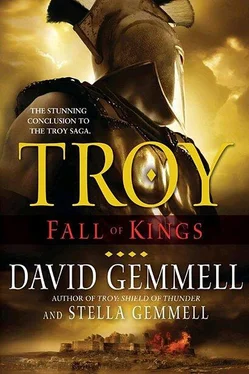Stella Gemmell - Fall of Kings
Здесь есть возможность читать онлайн «Stella Gemmell - Fall of Kings» весь текст электронной книги совершенно бесплатно (целиком полную версию без сокращений). В некоторых случаях можно слушать аудио, скачать через торрент в формате fb2 и присутствует краткое содержание. Год выпуска: 2011, Жанр: Исторические приключения, на английском языке. Описание произведения, (предисловие) а так же отзывы посетителей доступны на портале библиотеки ЛибКат.
- Название:Fall of Kings
- Автор:
- Жанр:
- Год:2011
- ISBN:нет данных
- Рейтинг книги:4 / 5. Голосов: 1
-
Избранное:Добавить в избранное
- Отзывы:
-
Ваша оценка:
- 80
- 1
- 2
- 3
- 4
- 5
Fall of Kings: краткое содержание, описание и аннотация
Предлагаем к чтению аннотацию, описание, краткое содержание или предисловие (зависит от того, что написал сам автор книги «Fall of Kings»). Если вы не нашли необходимую информацию о книге — напишите в комментариях, мы постараемся отыскать её.
Fall of Kings — читать онлайн бесплатно полную книгу (весь текст) целиком
Ниже представлен текст книги, разбитый по страницам. Система сохранения места последней прочитанной страницы, позволяет с удобством читать онлайн бесплатно книгу «Fall of Kings», без необходимости каждый раз заново искать на чём Вы остановились. Поставьте закладку, и сможете в любой момент перейти на страницу, на которой закончили чтение.
Интервал:
Закладка:
“They will come here, then?” Dios asked. “We cannot stop them?”
“They will come from the north, from the south, from the sea. Agamemnon, Menelaus, Achilles, Odysseus…” His voice tailed away. “And all the lesser kings, bandit chiefs, and mercenary bands seeking plunder.”
“But you will be here to defeat them,” Dios said.
“If the gods will it, Dios, then yes, I will be here. As will you, my brothers.”
Dios laughed aloud and clapped Paris on the back. “You hear that, Paris? You are going to be a hero.” Taking the helm from Paris’ hands, Dios placed it on his brother’s head. It was too large and slid down over his eyes.
“It is as if great Herakles himself has returned from Elysium!” Dios laughed.
Paris dragged the helm clear and threw it at Dios, who ducked. The helm struck the wall and clanged to the floor. Paris lunged at Dios, grabbing his tunic. Dios staggered, and they both fell. Dios scrambled up, but Paris grabbed his ankle and tried to drag him back. Hektor smiled, and his thoughts went back to the days of childhood. Dios and Paris had always been close. Dios unruly and disobedient, Paris quiet and scholarly—they were an odd pair.
Priam’s voice suddenly thundered out. “What in the name of Hades is going on here?”
The two brothers ceased their wrestling and climbed to their feet. Priam advanced down the corridor, his face flushed, his eyes angry. “By the balls of Ares, are you morons?” he shouted. “Sons of Priam do not squabble like children.”
“Sorry, Father,” Paris said. “It was my fault.”
“You think I care whose fault it was? Get out of my sight, the pair of you.”
Dios and Paris backed away. “Whose is this?” Priam asked, pointing to the dented bronze helm.
“Mine, Father,” Paris told him. Priam hooked his foot under the brow of the helm and skillfully flicked it up in the air toward Paris. The young man reached out hesitantly, and the helm struck his fingers. With a cry of pain he leaped back, and the helm once more bounced to the floor.
“I must have been sick with fever the day I sired you.” Priam sneered, turning on his heel and striding back to the Amber Room. As the insult echoed in the air, Paris looked crestfallen.
Hektor picked up the fallen helm, handing it to Paris. “He has much on his mind, Brother,” he said.
“Perhaps,” Paris answered bleakly, “but what difference does that make? When has he ever missed an opportunity to humble his sons?”
Dios stepped in and curled his arm over his younger brother’s shoulder. “Do not take it so seriously, Paris,” he advised. “Priam is old and increasingly frail. With luck we will both live long enough to piss on his funeral pyre.”
Paris grinned. “That is a happy thought,” he said.
The three brothers walked out of the palace into the midmorning sunlight. Dios and Paris set off for the lower town, and Hektor made his way back to his own palace. There he found little Astyanax with his nurse, playing in the gardens. The child, dressed in a small leather breastplate and helm, was bashing a toy sword against a shield held by the nurse. Then the boy saw him and cried out, “Papa!” Dropping his wooden blade, he ran at Hektor, who dropped to one knee and caught him, flinging him high in the air and then catching him. Astyanax squealed with delight. Hektor hugged him close.
“Will you be the monster now, Papa?” Astyanax asked.
He gazed into the child’s sapphire-blue eyes. “What does the monster do?”
“He kills people,” Astyanax told him.
Hektor lifted the small helm from the boy’s head and ruffled his red hair. “Can I not just be Papa for a while and give you a big hug?”
“No!” Astyanax cried. “I want to kill the monster.” Hektor put the boy down, then dropped to his knees.
“You can try,” he growled, baring his teeth in a snarl and giving a great roar like a lion. Astyanax squealed and ran back several paces to hide behind the nurse. Then, waving his wooden sword, the little boy rushed at Hektor.
CHAPTER FOUR
BLOOD IN THE MARKET
Plouteus the merchant had fallen in love with Troy during his six years in the city. Despite being a foreigner, he had been accepted warmly by his neighbors and treated with courtesy by his fellow merchants and had come to regard the Golden City as the home of his heart, if not his blood. He was considered a lucky man, for his ships always seemed to find a way through the blockades, bringing silks and spices up from Miletos and even smuggled copper from Kypros.
Life was good for Plouteus, and he gave thanks every day at the temple of Hermes, offering white doves to the winged-heeled god of merchants. Ten times a season he also made sacrifices to Athene, guardian goddess of Troy, and once a year he made a donation of ten gold ingots to the temple of Zeus the All-Father. Plouteus was above all else a man of religion and piety.
He also was known in his homeland as a man of steadfast loyalty, a reputation he had been proud of all his life. Until this day.
Plouteus sat quietly with his guest in a secluded corner of his garden, a brazier burning close by. The visitor was younger and slimmer than the portly Plouteus, and where the merchant was ruddy-faced and friendly, the newcomer was hollow of cheek and cold of eye. A chill breeze blew across the garden. Dancing embers whirled up from the brazier. The newcomer swore softly. Plouteus saw his hands brushing at his blue cloak and guessed that a hot ash had settled on the garment. Plouteus rubbed at his eyes. Bright sunlight made them water and caused his head to ache.
“It would be warmer inside,” his guest said.
“Yes, it would,” Plouteus agreed. “But out here, in the cold, Actonion, no one will hear us.”
“You already know what is required,” Actonion said, tugging at his thin black chin beard. “We need speak no more of it.”
“You do not understand the nature of the task you are suggesting,” Plouteus argued.
Actonion raised his hand, wagging his finger. “I am suggesting nothing, Plouteus. I have brought you instructions from your lord. Your king desires the death of an enemy. You and your sons will kill this man of evil.”
“Just like that?” Plouteus snapped, reddening. “My boys are brave enough, but they are untrained. And I, as you can see, have fully enjoyed the fine foods of Troy. Why is it that we are asked to do this? Why not men of blood like yourself? Why not soldiers or assassins?”
The newcomer’s cold eyes hardened further. “So,” he said, “now you seek to question our master’s wisdom. You worm! Everything you have here Agamemnon King has given you. You swore to serve him in any way he desired. Now you balk at the first danger.”
“It is not the first,” Plouteus said, defiance in his voice. “My sons and I have gathered information, sent reports. We have risked our lives many times. But once we have accomplished this task today—if indeed we can—our usefulness will be at an end. Can you not see that? When our troops come in the spring, would it not be valuable to have loyal men inside the city?”
“Of course. And we will have them,” Actonion replied. “You think you are the only spies in Troy?” He rose from his seat. “As I have told you, Helikaon is at the palace and meeting with Priam. When he leaves, he will walk back down through the lower town. You and your sons will waylay him and strike together.”
“He has been kind to us,” Plouteus observed sadly.
“So I am told.” Actonion sneered. “You have dined at his house and made trade deals with him. He gave your youngest son a pony on the day of his manhood. That is why you have been chosen for this task. We have tried sending soldiers. We have tried sending assassins. Always he has eluded death. He is cunning and crafty, and he has strength and speed. But few men seek to protect themselves from their friends.”
Читать дальшеИнтервал:
Закладка:
Похожие книги на «Fall of Kings»
Представляем Вашему вниманию похожие книги на «Fall of Kings» списком для выбора. Мы отобрали схожую по названию и смыслу литературу в надежде предоставить читателям больше вариантов отыскать новые, интересные, ещё непрочитанные произведения.
Обсуждение, отзывы о книге «Fall of Kings» и просто собственные мнения читателей. Оставьте ваши комментарии, напишите, что Вы думаете о произведении, его смысле или главных героях. Укажите что конкретно понравилось, а что нет, и почему Вы так считаете.












